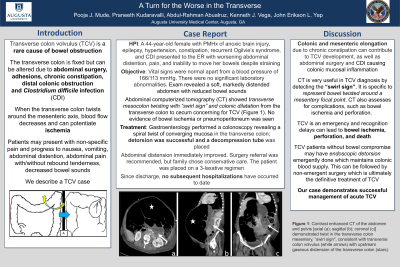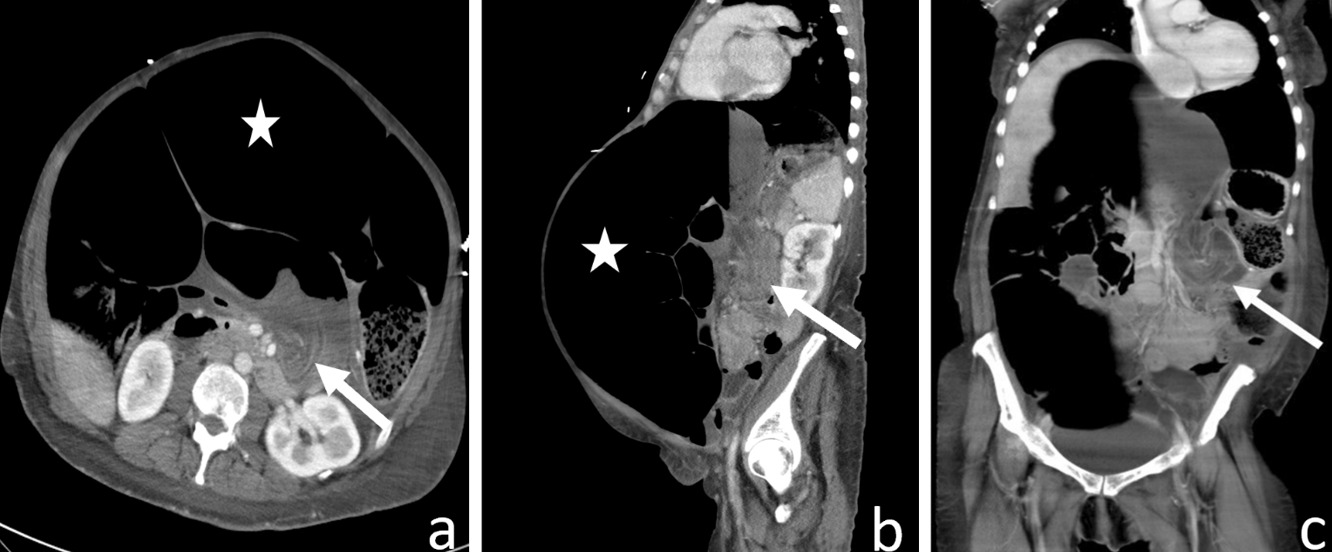Back


Poster Session D - Tuesday Morning
Category: Colon
D0119 - A Turn for the Worse in the Transverse
Tuesday, October 25, 2022
10:00 AM – 12:00 PM ET
Location: Crown Ballroom

Has Audio

Pooja J. Mude, DO
Augusta University Medical Center
Augusta, GA
Presenting Author(s)
Pooja J. Mude, DO1, Praneeth Kudaravalli, MD1, Abdul-Rahman Abualruz, MD1, Kenneth J. Vega, MD, FACG2, John Erikson L. Yap, MD2
1Augusta University Medical Center, Augusta, GA; 2Augusta University Medical College of Georiga, Augusta, GA
Introduction: Transverse colon volvulus (TCV) is a rare cause of bowel obstruction. Normally, the transverse colon is fixed but can be altered due to abdominal surgery, adhesions, chronic constipation, distal colonic obstruction and Clostridium difficile infection (CDI). When the transverse colon twists around the mesenteric axis, blood flow decreases and can potentiate ischemia. Patients may present with non-specific pain and progress to nausea, vomiting, abdominal distention, abdominal pain with/without rebound tenderness, and decreased bowel sounds. We describe a TCV case below.
Case Description/Methods: A 44-year-old female with PMHx of anoxic brain injury, epilepsy, hypertension, constipation, recurrent Ogilvie’s syndrome, and CDI presented to the ER with worsening abdominal distention, pain, and inability to move her bowels despite straining. Her vital signs were normal apart from a blood pressure of 166/113 mmHg. There were no significant laboratory abnormalities. Exam revealed a soft, markedly distended abdomen with reduced bowel sounds. Abdominal computerized tomography (CT) showed transverse mesocolon twisting with “swirl sign” and colonic dilatation from the transverse colon to cecum concerning for TCV (Figure 1). No evidence of bowel ischemia or pneumoperitoneum was seen. Gastroenterology performed a colonoscopy revealing a spiral twist of converging mucosa in the transverse colon; detorsion was successful and a decompression tube was placed. Abdominal distension immediately improved. Surgery referral was recommended, but family chose conservative care. The patient was placed on a 3-laxative regimen. Since discharge, no subsequent hospitalizations have occurred to date.
Discussion: TCV is a rare form of colonic volvulus. Colonic and mesenteric elongation due to chronic constipation can contribute to TCV development, as well as abdominal surgery and CDI causing colonic mucosal inflammation. CT is very useful in TCV diagnosis by detecting the “swirl sign”. It is specific to represent bowel twisted around a mesentery focal point. CT also assesses for complications, such as bowel ischemia and perforation. TCV is an emergency and recognition delays can lead to bowel ischemia, perforation, and death. TCV patients without bowel compromise may have endoscopic detorsion emergently done which maintains colonic blood supply. This can be followed by non-emergent surgery which is ultimately the definitive treatment of TCV. Our case demonstrates successful management of acute TCV.

Disclosures:
Pooja J. Mude, DO1, Praneeth Kudaravalli, MD1, Abdul-Rahman Abualruz, MD1, Kenneth J. Vega, MD, FACG2, John Erikson L. Yap, MD2. D0119 - A Turn for the Worse in the Transverse, ACG 2022 Annual Scientific Meeting Abstracts. Charlotte, NC: American College of Gastroenterology.
1Augusta University Medical Center, Augusta, GA; 2Augusta University Medical College of Georiga, Augusta, GA
Introduction: Transverse colon volvulus (TCV) is a rare cause of bowel obstruction. Normally, the transverse colon is fixed but can be altered due to abdominal surgery, adhesions, chronic constipation, distal colonic obstruction and Clostridium difficile infection (CDI). When the transverse colon twists around the mesenteric axis, blood flow decreases and can potentiate ischemia. Patients may present with non-specific pain and progress to nausea, vomiting, abdominal distention, abdominal pain with/without rebound tenderness, and decreased bowel sounds. We describe a TCV case below.
Case Description/Methods: A 44-year-old female with PMHx of anoxic brain injury, epilepsy, hypertension, constipation, recurrent Ogilvie’s syndrome, and CDI presented to the ER with worsening abdominal distention, pain, and inability to move her bowels despite straining. Her vital signs were normal apart from a blood pressure of 166/113 mmHg. There were no significant laboratory abnormalities. Exam revealed a soft, markedly distended abdomen with reduced bowel sounds. Abdominal computerized tomography (CT) showed transverse mesocolon twisting with “swirl sign” and colonic dilatation from the transverse colon to cecum concerning for TCV (Figure 1). No evidence of bowel ischemia or pneumoperitoneum was seen. Gastroenterology performed a colonoscopy revealing a spiral twist of converging mucosa in the transverse colon; detorsion was successful and a decompression tube was placed. Abdominal distension immediately improved. Surgery referral was recommended, but family chose conservative care. The patient was placed on a 3-laxative regimen. Since discharge, no subsequent hospitalizations have occurred to date.
Discussion: TCV is a rare form of colonic volvulus. Colonic and mesenteric elongation due to chronic constipation can contribute to TCV development, as well as abdominal surgery and CDI causing colonic mucosal inflammation. CT is very useful in TCV diagnosis by detecting the “swirl sign”. It is specific to represent bowel twisted around a mesentery focal point. CT also assesses for complications, such as bowel ischemia and perforation. TCV is an emergency and recognition delays can lead to bowel ischemia, perforation, and death. TCV patients without bowel compromise may have endoscopic detorsion emergently done which maintains colonic blood supply. This can be followed by non-emergent surgery which is ultimately the definitive treatment of TCV. Our case demonstrates successful management of acute TCV.

Figure: Contrast enhanced CT of the abdomen and pelvis [axial (a); sagittal (b); coronal (c)] demonstrated twist in the transverse colon mesentery, “swirl sign", consistent with transverse colon volvulus (white arrows) with upstream gaseous distension of the transverse colon (stars).
Disclosures:
Pooja Mude indicated no relevant financial relationships.
Praneeth Kudaravalli indicated no relevant financial relationships.
Abdul-Rahman Abualruz indicated no relevant financial relationships.
Kenneth Vega indicated no relevant financial relationships.
John Erikson Yap indicated no relevant financial relationships.
Pooja J. Mude, DO1, Praneeth Kudaravalli, MD1, Abdul-Rahman Abualruz, MD1, Kenneth J. Vega, MD, FACG2, John Erikson L. Yap, MD2. D0119 - A Turn for the Worse in the Transverse, ACG 2022 Annual Scientific Meeting Abstracts. Charlotte, NC: American College of Gastroenterology.
